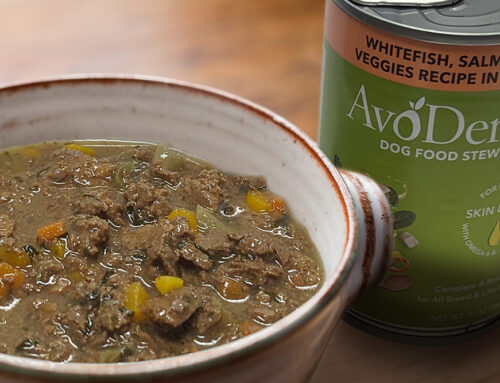Eating the exact same food everyday can quickly get boring, even for your dog. Rather than giving Fido the same meal all the time, rotate his food to tantalize his taste buds with different flavors and textures. Not only will he appreciate the variety, but food rotation will provide him with a well-balanced diet, and can help prevent him from developing food allergies or intolerance.
Food Allergies and Intolerance
Over time — perhaps even over several years — your dog may become allergic to one or more of the ingredients —usually proteins — in his food if he is fed the same diet continually.1
Food allergies occur when your dog’s immune system overreacts to the offending ingredients in the food that he eats. This overreaction leads to the release of inflammation-causing chemicals (histamines) and symptoms which can include itchy skin, respiratory issues or an upset stomach.2 By rotating his menu regularly, you can reduce his chances of developing food allergies.
Food intolerance, on the other hand, doesn’t involve your dog’s immune system, although its symptoms can be similar to those of allergies. When your pooch suffers from food intolerance, his gastrointestinal system is unable to properly digest a particular ingredient in the food recipe. Symptoms of a food intolerance usually occur soon after a meal and may include diarrhea and vomiting.
The Nutritional and Health Benefits of a Rotation Diet
Dr. Jean Dodds, DVM, founder of the Hemopet, a blood bank for pets located in Garden Grove, California, recommends a rotation diet for dogs to help prevent issues with food intolerance.3 According to Dr. Dodds, rotating foods mimics the ancestral diet of dogs and helps to “create a strong intestinal environment” that reduces the chances of your dog developing food intolerance. This is especially true in puppies. Dr. Dodds also recommends that if you feed your dog commercial food, “rotating should involve using different formulas in the same line so that your pet benefits from a variety of animal proteins, fruits and vegetables.”
When you rotate your dog’s diet, you provide him with more than one meat-based protein. Each protein has a different amino acid profile, meaning that each has a unique nutritional value. By experiencing more than one type of meat-based protein and the various nutrients they provide, your dog gets the best of all protein worlds.
Essential fatty acids are key to normal growth and good canine health. They help to keep your dog’s skin and coat healthy.4
The AvoDerm Advantage
The most common allergens in dog food include proteins such as beef, chicken and egg. Grains and gluten, ingredients found in many dog foods, also contain proteins, making them potential allergens. But AvoDerm’s Revolving Menu recipes are nutritionally balanced, include Omega-3 and Omega-6 essential fatty acids, and contain unique meat-based proteins, including trout, turkey, duck and lamb.
Each AvoDerm recipe is grain and gluten free, consists of a single meat, and is available in both dry and canned formulas designed for rotation, reducing the chances that your pup will have an allergic reaction or get an upset stomach. All AvoDerm foods also contain avocado meal and avocado oil, which help keep your dog’s coat silky, and have been proven to be both beneficial and safe for your pet.
Special Considerations
When transitioning your dog to a new food, mix a bit of the new food in with the old over a period of six days to avoid gastrointestinal upset. Darlene Richards, a Licensed Veterinary Technician in Las Vegas, Nevada does caution that, “if you know you have concerns about an older dog or it is the first time you are making a change to their diet, a longer transition of a month or more should be considered.”
SOURCES:
- “Itchy Dogs — Is Food the Problem?” Texas A&M University, August 16, 2012.
- “Allergy – General in Dogs,” VCA Animal Hospitals.
- Dodd, Jean. “Food Transitioning Versus Food Rotating: What is the Difference? ” Dr. Jean Dodd’s Pet Health Research Blog, June 25, 2013.
- Kraun, Michael, “Benefits of Omega-3 Fatty Acids in Dogs and Cats ,” Michigan State University.





